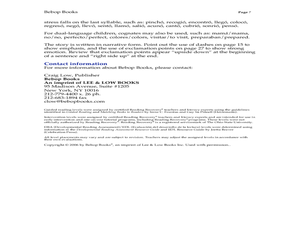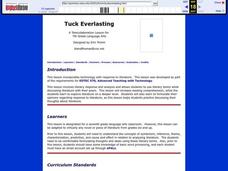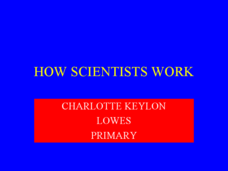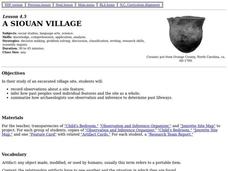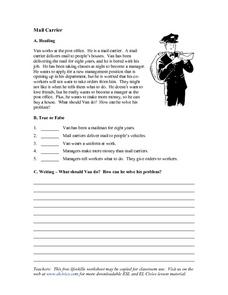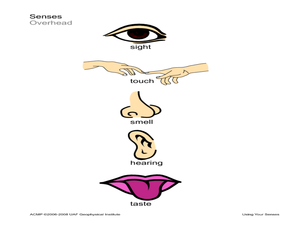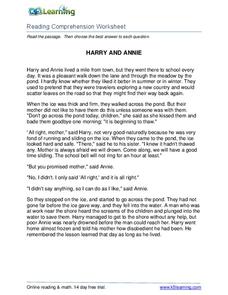Curated OER
Guided Reading with Elizabeti's Doll
Practice reading strategies using Elizabeti's Doll by Stephanie Stuve-Bodeen. Readers utilize decoding and comprehension strategies before, during, and after reading the story. A detailed list of text features, high frequency words,...
Curated OER
Tuck Everlasting
Seventh graders use literary terms while discussing literature with their peers. They explore literature on a deeper level. Students formulate their opinions regarding response to literature, as this lesson helps students practice...
K20 LEARN
OPTIC - A Reading Strategy Recipe: Visual Literacy
A visual literary lesson provides learners with OPTIC (Observations, Predictions, Themes, Inferences, Conclusions), a reading strategy to help them understand and interpret visual and written texts. Scholars practice the strategy with a...
Crafting Freedom
Harriet Jabocs and Elizabeth Keckly: The Material and Emotional Realities of Childhood in Slavery
Learning how to make accurate inferences by putting together facts found in multiple sources is one of those skills all learners must develop, but one that can be a challenge to teach. This resource is a must-have for your curriculum...
Curated OER
How Scientists Work
The arsenal of tools a scientist uses to observe the world are varied. This great presentation gives students a look at some of the strategies they should use when looking at the world around them. The information can be used as a...
Curated OER
Reading Comprehension: Voice of Nature
Understanding a text can be a very interesting task. Fourth graders read a passage describing the origin of an Aboriginal myth. They answer 11 comprehension questions that require them to pull key details, use context, and think...
Curated OER
A Siouan Village
Fourth graders examine the artifacts obtained from an excavated Siouan village site. They make inferences about the people who once lived there based on the artifacts and complete a Research Team Report.
Curated OER
Motel of Mysteries
Students determine that even though inferences are based on observations that does not mean they are always true or correct. They pull the topics and main ideas out of a piece of difficult text.
Curated OER
Pop Rock Chemistry
For this pop rock chemistry worksheet, middle schoolers suck on pop rocks, they mix open pop rocks with water and they observe them on a paper towel with water. Students write down as many observations as they can and they write down as...
Curated OER
The Diary of Anne Frank
Eighth graders read the Diary of Anne Frank. In this novel reading instructional activity, 8th graders read and analyze the story. Students do online activities and create a newspaper giving a summary of three major events in the story....
Curated OER
Big Bushy Mustache: comprehension skills
In this comprehension skills worksheet, students read the book Big Bushy Mustache and complete comprehension activities. Students complete 5 activities including note taking, making inferences, fiction and non fiction, drawing...
Curated OER
Tomas and the Library Lady
Students practice read aloud comprehension strategies. In this literacy comprehension lesson plan, students listen to Tomas and the Library Lady, stopping to discuss with a partner aspects of the story suggested by the teacher. Students...
Curated OER
Mail Carrier
In this reading comprehension activity, students read a passage about a mail carrier then answer 5 true or false questions that involve making inferences based on the reading passage. Then students write an opinion paragraph suggesting...
Curated OER
The Gingerbread Boy Comes Alive
Students make cut-out gingerbread cookies. After reading "The Gingerbread Boy", their cookies "disappear" and students must make predictions and draw conclusions about what happened to their cookies.
Curated OER
Using Your Senses
Students make observations. In this sensory skills instructional activity, students use their senses as well as tools that sharpen their senses to make observations regarding foods and other items.
Ohio Department of Education
Observe Then Infer
To develop their skill at drawing inferences from observations, sixth graders rotate through six stations, conduct a series of experiments, make observations, and draw inference from what they observe.
Workforce Solutions
On the Job
Four lessons spotlight a variety of professions while boosting listening and observational skills and making inferences. Lesson one challenges pupils to group cards based on a commonality then justify the relationship they see. Lesson...
EduGAINs
Data Management
Using a carousel activity, class members gain an understanding of the idea of inferences by using pictures then connecting them to mathematics. Groups discuss their individual problems prior to sharing them with the entire class. The...
Tell City Schools
The Cay
Support your instruction of The Cay by Theodore Taylor with this extensive unit of materials. Provided here are prereading activities, worksheets and discussion questions for the entire book, and reading quizzes that you can use to check...
Curated OER
The True Confessions of Charlotte Doyle: Graphic Organizer
After completing the first five chapters of The True Confessions of Charlotte Doyle By Avi, use direct quotes to make inferences about how Charlotte feels about certain characters. Later, when the novel has concluded, revisit the text to...
K5 Learning
Harry and Annie
Henry and Annie are on thin ice—literally! Read about the siblings' winter walk and the importance of staying safe with a short passage and four follow-up questions.
NOAA
History's Thermometers
How is sea coral like a thermometer? Part three of a six-part series from NOAA describes how oceanographers can use coral growth to estimate water temperature over time. Life science pupils manipulate data to determine the age of corals...
Prestwick House
"Because I could not stop for Death" -- Visualizing Meaning and Tone
Emily Dickinson's "Because I could not stop for Death" provides high schoolers with an opportunity to practice their critical thinking skills. They examine the images, diction, rhythm, and rhyme scheme the poet uses and consider how...
CPALMS
Analyzing Vonnegut's View of the Future and His Commentary on the Present in Harrison Bergeron
Kurt Vonnegut's short story "Harrison Bergeron" engages adolescents with its theme about the dangers of complete societal equality. Learners complete a graphic organizer to track literary elements in the story, as well as an inference...
Other popular searches
- Making Inference in Math
- Teaching Making Inference
- Making Inference Handout
- Making Inference Using Art
- Making Inference Worksheet
- Inference and Prediction
- Making Inference Review Game
- Making Inference Lessons
- Lesson on Making Inference
- Making Inference Using Coin
- Making Inference: Reading
- Making Inference Seuss


